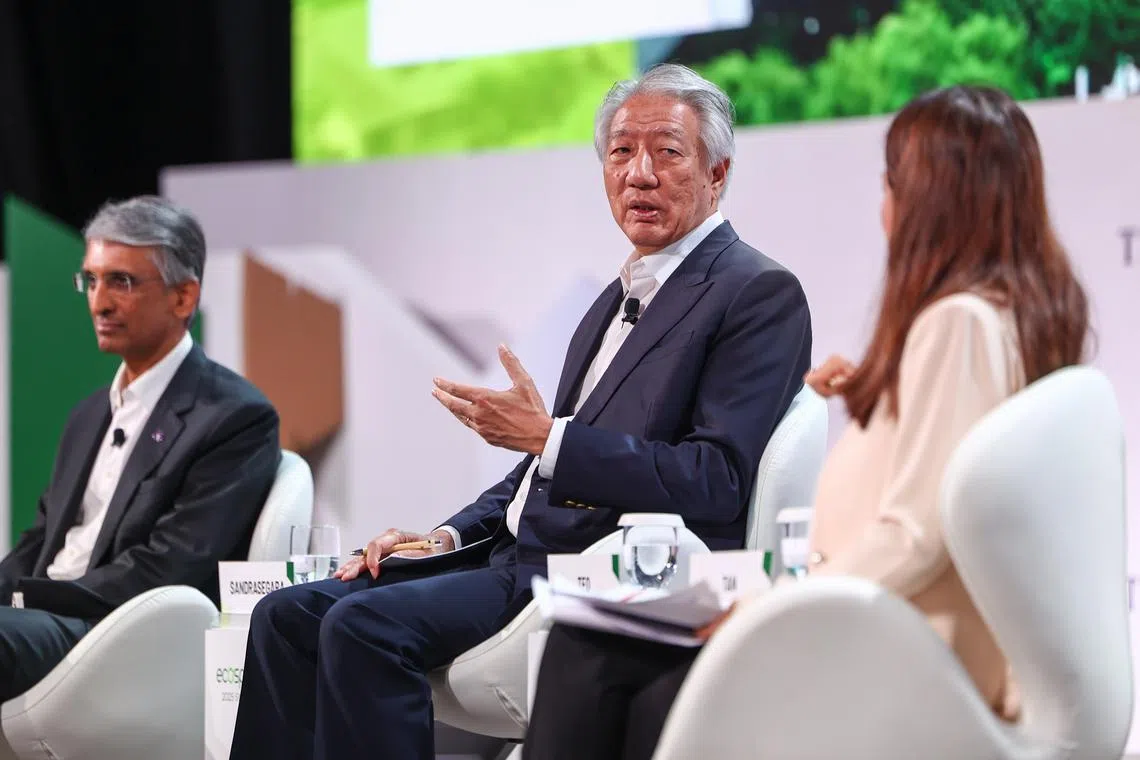News analysis
Singapore signals commitment, policies to draw green dollar during Ecosperity Week
Sign up now: Get ST's newsletters delivered to your inbox

Economic uncertainties may persist, but climate change is still something the world has to prepare for.
ST PHOTO: LIM YAOHUI
SINGAPORE – Despite faltering climate action around the world, Singapore recognises the urgent need to tackle the crisis, and is signalling that it has the commitment and the right policies to draw in the green dollar.
This was the message to global investors during Ecosperity Week, the flagship sustainability conference organised by Singapore investment firm Temasek and held between May 5 and 8.
It was conveyed in a few ways.
First, by clearly communicating that Singapore is supportive of climate action, and will not flip-flop on this stance.
On May 6, Senior Minister Teo Chee Hean, who heads the Inter-Ministerial Committee on Climate Change, said in his keynote speech that Singapore will continue to work with partners to tackle the planetary crisis
Pointing to the escalating impacts of climate change, SM Teo said: “We will secure Singapore’s future by doing our part and collaborating with the world to reduce emissions.”
Singapore also sought to establish that it has the right policies to promote decarbonisation domestically and across the broader Asean region.
Given the business slant of the audience, the Republic also highlighted that this push to tackle climate change is not merely a cost to be shouldered, but there are economic benefits to be reaped as well.
Ecosperity Week and its partner events were attended by business leaders, investors, philanthropists, policymakers and civil society leaders from around the world.
Singapore is spearheading efforts to promote transition credits – a new class of carbon credits which can enable the early phase-out of coal plants in the region.
Coal is the most pollutive fossil fuel, and developing South-east Asia has some of the world’s youngest coal plants.
Tackling climate change would require such plants to be phased out as soon as possible, but given the long runway of coal plants in the region, this seems unlikely to happen on its own.
Transition credits aim to monetise emissions savings from the early closure of coal plants. Revenue would come from the sale of carbon credits to companies or governments, with each credit representing a tonne of emissions avoided by shutting a power plant early.

Senior Minister Teo Chee Hean speaking at a panel discussion at Ecosperity Week on May 6.
PHOTO: LIANHE ZAOBAO
On May 7, it was announced that Japanese conglomerate Mitsubishi Corporation had joined Singapore’s Keppel and investment platform GenZero
The aim is to retire the plant by 2030 – ahead of its scheduled closure in 2040 – and replace it with renewable energy and battery storage.
The initiative, if successful, could be a model used to shut down dozens of other coal plants early around the globe, especially in Asia.
A report released on May 7 by global management consultancy BCG and Temasek showed that expenditure on climate adaptation and resilience is projected to rise to between US$500 billion (S$648 billion) and US$1.3 trillion a year by 2030
This presents an opportunity for investors to put their money into growth sectors for climate adaptation solutions, such as hazard warning systems, climate-resilient crops and flood defences.
The importance of collaborations and partnerships – between countries and sectors – in tackling climate change was also repeatedly emphasised during the week.
This is notable given the inward-leaning policies being promoted in other parts of the world.
A planetary crisis like climate change cannot be tackled by one country alone, and collaborations can help to broaden the market for sustainable investments.
At Ecosperity Week and partner events like the GenZero Climate Summit and the Climate Group Asia Action Summit, at least three areas of collaboration were discussed: carbon markets, the Asean power grid and blended finance.
Carbon markets allow countries to collaborate on climate action, as they allow funds to flow from large emitters, usually developed countries, to countries where carbon projects are usually hosted, usually developing countries.
This can spark a whole industry – carbon services
Singapore had identified carbon services as an engine of growth for its green economy in the Singapore Green Plan 2030
Regarding the Asean grid, Singapore has sent a strong policy signal with a goal that by 2035, some 30 per cent of its energy supply
This commitment provides investors with some degree of revenue certainty.
But some investments, such as in subsea cables, can be costly and risky, which highlights the need for another form of collaboration between sectors.
This is where blended finance comes into play, leveraging public and philanthropic funding support to entice private funding to come on board.
Singapore’s Ambassador for Climate Action Ravi Menon summed it up well when he spoke about the importance of “how to make money work harder, more effectively”.
Public funding is willing but insufficient, while private funding is ample but unwilling to commit owing to high risks or because returns are not commensurate with the risks, the former chief of Singapore’s central bank said during a panel discussion at the Philanthropy Asia Summit, an Ecosperity partner event.
Collaboration among the public, private and philanthropic sectors on financing can significantly scale the amount of money available for sustainable investments.
The 11th edition of the annual sustainability conference comes amid significant global headwinds to climate action – a far cry from some years earlier, when countries were racing to help their economies recover from the Covid-19 pandemic in an environmentally sustainable way.
Economic uncertainties and trade concerns are undoubtedly top of mind in the current geopolitical context. But climate change impacts will not spare us just because we are not paying attention.
As SM Teo said: “We must be clear-minded... Long-term success requires both a firm grasp of the demands of today and a steady eye on the needs of tomorrow.”
Audrey Tan is an assistant news editor overseeing sustainability coverage. She has reported on the environment for more than a decade and hosts the Green Pulse podcast series.



